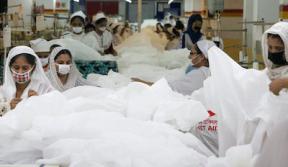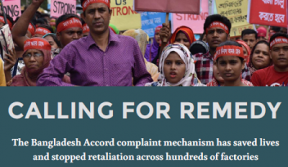Phillips Van- Heusen (PVH), which operates Tommy Hilfiger, Calvin Klein, and other apparel brands, has made an unprecedented set of commitments to protect apparel workers in Bangladesh from the grievous safety hazards that have taken hundreds of lives in recent years. The agreement between PVH and labor rights organizations and unions in Bangladesh and internationally is a vital step forward for workers in Bangladesh.
The agreement, and the series of deadly fires in Bangladesh that make it so vitally necessary, are the subject of a major report by the ABC News investigative unit which will appear tonight on "World News With Diane Sawyer" at 6:30 ET and on "Nightline" at 11:35 ET.
The effort to achieve this agreement has been broad-based. It has been led by unions in Bangladesh, supported by the ITGLWF, the global federation of garment unions, and by international labor rights groups, including the Clean Clothes Campaign in Europe, the Maquila Solidarity Network in Canada, and the International Labor Rights Forum in the US, as well as the WRC.
This fire safety agreement is groundbreaking, because:
- It is not a verbal promise, or a voluntary initiative, but a legally binding contract between PVH – and any other brands that join – and worker representatives.
- It will, for the first time, allow fire safety inspections led by people outside the apparel industry, with inspection reports made public.
- Under the agreement, the brands will require all of their suppliers in Bangladesh to open themselves to inspection, and, most importantly, to eliminate any fire hazards the inspections uncover and make their factories safe. Brands cannot continue doing business with any supplier that refuses to make necessary repairs. Also, under the agreement, the brands are committed to pay prices to suppliers that make it feasible for the suppliers to make the necessary repairs.
- Under the agreement, brands must require suppliers to accept worker-led health and safety committees in every factory, so that workers will play a direct role in protecting themselves and their fellow workers.
The goal now is to convince more brands and retailers to accept the obligations of this program so that it can be fully implemented and begin to transform the apparel industry in Bangladesh from the most dangerous in the world for workers to an industry that is fundamentally safe. Without additional brands, the program cannot be implemented.
The burden is now on Gap, Kohl's, JC Penney and other brands involved in the deadly Hameem fire to demonstrate, in deeds not just words, that they care about protecting the lives of the workers who make their clothing. What makes this agreement different is that it is not another voluntary, non-binding set of unenforceable corporate promises – it is a binding agreement under which the participating brands will have to open up their factories in Bangladesh to public scrutiny and make these factories safe. PVH has signed on to these commitments. The question now is whether other brands are willing to take the steps necessary to protect the lives of the people who make their clothes.
The steps PVH is taking are highly significant and, if other brands follow suit, will save lives in Bangladesh. We have criticized PVH in the past for their approach to these issues. We would be remiss if we did not now credit them for the steps they have agreed to take. They are ahead of their competitors.
It is important to bear in mind that this is one important step, in one country. It does not address all of the serious labor rights problem in Bangladesh, or in the broader industry. It does, however, address, in an effective way, one of the gravest threats to the well-being of apparel workers anywhere in the world. It is very good news for the workers of Bangladesh.
The Worker Rights Consortium (WRC) is a non-profit labor rights organization that investigates working conditions in factories around the world on behalf of more than 175 universities and colleges.

